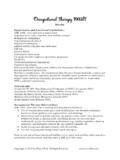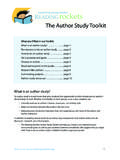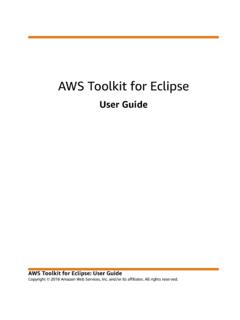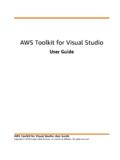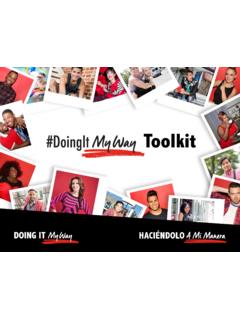Transcription of Managing Conflict of Interest in the Public Sector - …
1 Managing Conflict of Interest in the Public SectorA toolkit Managing Conflict of Interest in the Public SectorA TOOLKITC onflicts of Interest in both the Public and private sectors have become a major matter of Public concern world-wide. The OECD Guidelines define a Conflict of Interest as occurring when a Public official has private-capacity interests which could improperly influence the performance of their official duties and responsibilities. However, identifying a specific Conflict of Interest in practice can be difficult. And resolving the conflicting interests appropriately in a particular case is something that most people find even more toolkit focuses on specific techniques, resources and strategies for: Identifying, Managing and preventing Conflict -of- Interest situations more effectively; and Increasing integrity in official decision-making, which might be compromised by a Conflict of toolkit provides non-technical, practical help to enable officials to recognise problematic situations and help them to ensure that integrity and reputation are not compromised.
2 The tools themselves are provided in generic form. They are based on examples of sound Conflict -of- Interest policy and practice drawn from various OECD member and non-member countries. They have been designed for adaptation to suit countries with different legal and administrative READINGM anaging Conflict of Interest in the Public Service: OECD Guidelines and Country Experiences -:HSTCQE=UV]WW]:w w w. o e c d . o rg Managing Conflict OF Interest IN THE Public Sector A ToolkitISBN 92-64-01822-0 42 2005 12 1 PThe full text of this book is available on line via this link: with access to all OECD books on line should use this link: is the OECD s online library of books, periodicals and statistical databases. For more information about this award-winning service and free trials ask your librarian, or write to us at Conflictof Interestin the Public SectorA TOOLKITORGANISATION FOR ECONOMIC CO-OPERATION AND DEVELOPMENTORGANISATION FOR ECONOMIC CO-OPERATION AND DEVELOPMENTThe OECD is a unique forum where the governments of 30 democracies work together to address the economic, social and environmental challenges of globalisation.
3 The OECD is also at the forefront of efforts to understand and to help governments respond to new developments and concerns, such as corporate governance, the information economy and the challenges of an ageing population. The Organisation provides a setting where governments can compare policy experiences, seek answers to common problems, identify good practice and work to co-ordinate domestic and international OECD member countries are: Australia, Austria, Belgium, Canada, the Czech Republic, Denmark, Finland, France, Germany, Greece, Hungary, Iceland, Ireland, Italy, Japan, Korea, Luxembourg, Mexico, the Netherlands, New Zealand, Norway, Poland, Portugal, the Slovak Republic, Spain, Sweden, Switzerland, Turkey, the United Kingdom and the United States.
4 The Commission of the European Communities takes part in the work of the Publishing disseminates widely the results of the Organisation s statistics gathering and research on economic, social and environmental issues, as well as the conventions, guidelines and standards agreed by its available in French under the title:G rer les conflits d int r ts dans le secteur publicMODE D EMPLOI Illustrations: L szl QuittNo reproduction, copy, transmission or translation of this publication may be made without written permission. Applications should be sent to OECD Publishing: or by fax (33 1) 45 24 13 91. Permission to photocopy a portion of this work should be addressed to the Centre fran ais d'exploitation du droit de copie, 20, rue des Grands-Augustins, 75006 Paris, France work is published on the responsibility of the Secretary-General of the OECD.
5 The opinions expressed and arguments employed herein do not necessarily reflect the official views of the Organisation or of the governments of its member Conflict OF Interest IN THE Public Sector ISBN 92-64-01822-0 OECD 20053 ForewordIdentifying and resolving Conflict -of- Interest situations is crucial to good governance and maintaining trust in Public institutions. However, experience shows that this can be difficult to achieve in daily practice. In response to growing demand in the Public Sector , this toolkit provides a set of practical solutions for developing and implementing ways to manage conflicts of Interest in accordance with the OECD Guidelines for Managing Conflict of Interest in the Public toolkit was developed in co-operation with OECD member and non- member countries.
6 Several international forums endorsed the toolkit for use in various regions, including South East Europe (High level Forum on Implementing Conflict of Interest Policies in Government and the Public Sector , Prague, November 2003), the Asia-Pacific region (ADB/OECD 4th Regional Anti-Corruption Conference for Asia and the Pacific, Kuala Lumpur, December 2003) and Latin America (Forum on Implementing Conflict of Interest Policies in the Public Service, Rio de Janeiro, May 2004). Various tools have already been adapted in national contexts or tested by Public organisations toolkit was prepared by Howard Whitton in collaboration with J nos Bert k of the OECD Public Governance and Territorial Development Directorate, with illustrations by L szl Quitt.
7 The author wishes to thank the OECD Expert Group on Conflict of Interest for the invaluable comments and suggestions, and Marie Murphy for her assistance in the preparation of the publication. TABL E O F C O N T E N T SMANAGING Conflict OF Interest IN THE Public Sector ISBN 92-64-01822-0 OECD 20055Ta b l e o f C o n t e n t sIntroduction to Conflict of Interest Management ..7 Conflict of Interest Management Tools: Listed by Application ..11 Tool Specifications:1. Conflict of Interest Definition..132. Conflict of Interest Diagrams 1-6 ..143. Objective Tests for Identifying a Conflict of Interest ..224. Generic Checklist for Identifying At-risk Areas for Conflict of Interest ..275. Generic Ethics Code Provisions Relevant to Conflict of Interest ..326.
8 Conflict of Interest Self-test ..357. Conflict of Interest General Provisions for Compliance ..378. Gifts and Gratuities Checklist ..429. Gifts for Officials Generic Law ..4410. Registration of Personal Interests and Assets Procedure..4811. Registration of Interests and Assets Generic Law..5512. Integrity Testing Policy ..6813. Public Interest Disclosure Policy and Procedure Whistleblower Protection..7014. Training Cases..7515. OECD Guidelines for Managing Conflict of Interest in the Public Service ..94 INTRODUCTION TO Conflict OF Interest MANAGEMENTMANAGING Conflict OF Interest IN THE Public Sector ISBN 92-64-01822-0 OECD 20057 Introduction to Conflictof Interest ManagementIn most countries there are increasing expectations from ordinary citizens, business leaders and civil society that governments should deliver higher standards of integrity in the civil service, Public institutions, Public services, government-controlled corporations, and government itself.
9 In this context, Conflict of Interest in its various forms should become a significant consideration in the day to day work of those who occupy any position of trust. This toolkit is intended to help to make those expectations a practical of Interest in the Public Sector are particularly important because, if they are not recognised and controlled appropriately, they can undermine the fundamental integrity of officials, decisions, agencies, and governments. Integrity is used in the Public Sector to refer to the proper use of funds, resources, assets, and powers, for the official purposes for which they are intended to be used. In this sense the opposite of integrity is corruption , or abuse . Conflict of Interest is both a straightforward and a complex matter: in principle easy to define in the Public Sector a Conflict of Interest arises when a Public official has private-capacity interests which could improperly influence the performance of their official duties and responsibilities.
10 * Establishing effective policy frameworks to control conflicts can be a complex task. To resolve a specific Conflict , it is necessary to establish relevant facts, apply the relevant law and policy, and distinguish between actual , apparent , real , and potential Conflict situations. This requires technical skill and an understanding of the many issues which are usually people are uncertain about this area of Public Sector ethics, partly because the language itself can be confusing. Having an Interest in, for example, the outcome of a decision is not the same as being interested in the outcome, curious. If officials could gain something personally from their decision they can be said to have an Interest in it.











